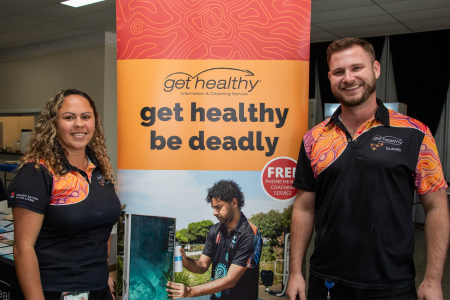
Midwife/Nurse Amy Thompson who shared her lived experience at the Stroke Week Health Expo.
Stroke Awareness: Be healthy and act F.A.S.T
Aug 17, 2023Amy Thompson is an Aboriginal Health nurse and midwife with first-hand stroke experience.
Amy shared her story at a community health event in Kempsey on Friday, 11 August, organised by Healthy North Coast in conjunction with National Stroke Week to spread the word on stroke and overall health and wellbeing.
Amy said she was helping a mother in the delivery suite of Macksville District Hospital when she experienced strange symptoms.
“My eyes wouldn’t stop watering. I didn’t realise that it was a stroke symptom,” she said.
“I was taken to the resuscitation bay and couldn’t talk, but my mind was still active.
“A colleague could see something was wrong and that I was having a stroke. I was taken by ambulance to Coffs Harbour Health Campus, where I had a CT scan and saw that I’d had a stroke.
“I was flown to John Hunter Hospital.
“There was no sign that I was at risk. I was fit and healthy and don’t smoke or drink.”
Amy is recovering from the stroke 15 months later and spoke at the event to spread the word about recognising the signs and symptoms of a stroke. Accessing medical attention as quickly as possible is vital in giving a stroke patient the best chance of surviving and recovering.
Stroke Care Coordinator for the Mid North Coast Local Health District, Jennifer Steel, said our region is a hot spot for stroke.
“We have high risk factors here,” Jennifer said.
“An aged population and limited access to health services in rural areas. Other risk factors for stroke are ones we can control by living a healthy lifestyle to reduce blood pressure and boost heart health.
“Unfortunately, our First Nations people are four times more likely to have a stroke and less likely to come to hospital. At our event in Kempsey, we are lucky to hear from Amy and several other speakers to increase awareness of stroke signs and symptoms and share knowledge of health and lifestyle factors that can help reduce the likelihood of stroke.”
To recognise some stroke symptoms, remember F.A.S.T.
Face: Has their face or mouth drooped?
Arms: Can they lift both arms?
Speech: Is their speech slurred? Do they understand you?
Time is critical: Call triple zero (000) immediately and ask for an ambulance.
Other possible signs include a loss of balance, weakness or paralysis somewhere, sudden loss of vision or blurred vision, sudden or severe headache, difficulty swallowing or loss of consciousness.
- Kera Ritchie and Ben McLellan from our Health Promotion team were on hand to spread the healthy message.
- Leanne Bryant, from the Stroke Foundation, and Cynthia Younie discuss healthy lifestyles at the Kempsey Stroke Week Health Expo.


